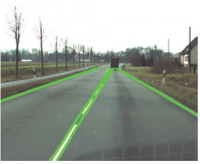Difference between revisions of "Directionality Analysis"
| Line 5: | Line 5: | ||
}} | }} | ||
| − | + | Welcome to this lecture on Directionality Analysis. | |
| − | |||
| − | == Teaching Material == | + | == Part 1: Edges, corners, lines, circles == |
| + | |||
| + | === Teaching Material === | ||
| − | |||
Get slides from Google docs (ppt) [https://drive.google.com/open?id=0B95UheoCtOzoQjhxWHhKYlR2WEk&authuser=0 here] | Get slides from Google docs (ppt) [https://drive.google.com/open?id=0B95UheoCtOzoQjhxWHhKYlR2WEk&authuser=0 here] | ||
| − | + | ||
| + | === References and sources === | ||
| + | |||
| + | R. Szeliski, “Computer Vision: Algorithms and Applications”, Springer 2010 | ||
| + | * Sections 4.2.1 (edges), 4.3.2 (Hough) | ||
| + | * Full book available online: http://szeliski.org/Book/ | ||
| + | |||
| + | |||
| + | Simon J.D. Prince, “Computer Vision: Models, Learning, and Inference”, Cambridge University Press, 2012 | ||
| + | * Sections 13.1.3 (edges), 13.2 (Canny, Harris) | ||
| + | * Full book available online: http://www.computervisionmodels.com/ | ||
| + | |||
| + | |||
| + | R. Klette, “Concise Computer Vision”, Springer, 2014 | ||
| + | * Sections 2.3.3, (edges), 2.3.4 (corners), 2.4. (edges), 3.4 (lines and circles) | ||
| + | * Get [https://drive.google.com/open?id=0B95UheoCtOzobnhLXzhfRnNxUnc&authuser=0 chapter 2] and [https://drive.google.com/open?id=0B95UheoCtOzobnhLXzhfRnNxUnc&authuser=0 chapter 3] | ||
| + | |||
| + | |||
| + | == Part 2: Structure tensor == | ||
| + | |||
| + | === Teaching Material === | ||
| + | |||
Get slides from Google docs (ppt) [https://drive.google.com/open?id=0B95UheoCtOzoSXBGbnZjdkZBSm8&authuser=0 here] | Get slides from Google docs (ppt) [https://drive.google.com/open?id=0B95UheoCtOzoSXBGbnZjdkZBSm8&authuser=0 here] | ||
| − | == | + | |
| + | === References and sources === | ||
| + | |||
| + | |||
| + | “Hard” references (full mathematical description): | ||
| + | |||
| + | J. Bigun, Vision with Direction, Springer, 2006 | ||
| + | * Chapters 10, 11 | ||
| + | |||
| + | J. Bigun, T. Bigun, K.Nilsson, Recognition by Symmetry Derivatives and the Generalized Structure Tensor, IEEE Trans on Pattern Analysis and Machine Intelligence, vol. 26, n. 12, December 2004 | ||
| + | |||
| + | |||
| + | A more “soft” source with a light, introductory description: | ||
| + | |||
| + | D. Teferi, Recognition and Evaluation by Video Synthesis Methods and Symmetry Features, PhD Thesis, Chalmers University of Technology, 2009 | ||
| + | * Sections 2.4, 5.2 | ||
Revision as of 18:28, 7 January 2015

| |
| Directionality Analysis | |
|---|---|
| Contact: Fernando Alonso-Fernandez |
Welcome to this lecture on Directionality Analysis.
Contents
[hide]Part 1: Edges, corners, lines, circles
Teaching Material
Get slides from Google docs (ppt) here
References and sources
R. Szeliski, “Computer Vision: Algorithms and Applications”, Springer 2010
- Sections 4.2.1 (edges), 4.3.2 (Hough)
- Full book available online: http://szeliski.org/Book/
Simon J.D. Prince, “Computer Vision: Models, Learning, and Inference”, Cambridge University Press, 2012
- Sections 13.1.3 (edges), 13.2 (Canny, Harris)
- Full book available online: http://www.computervisionmodels.com/
R. Klette, “Concise Computer Vision”, Springer, 2014
- Sections 2.3.3, (edges), 2.3.4 (corners), 2.4. (edges), 3.4 (lines and circles)
- Get chapter 2 and chapter 3
Part 2: Structure tensor
Teaching Material
Get slides from Google docs (ppt) here
References and sources
“Hard” references (full mathematical description):
J. Bigun, Vision with Direction, Springer, 2006
- Chapters 10, 11
J. Bigun, T. Bigun, K.Nilsson, Recognition by Symmetry Derivatives and the Generalized Structure Tensor, IEEE Trans on Pattern Analysis and Machine Intelligence, vol. 26, n. 12, December 2004
A more “soft” source with a light, introductory description:
D. Teferi, Recognition and Evaluation by Video Synthesis Methods and Symmetry Features, PhD Thesis, Chalmers University of Technology, 2009
- Sections 2.4, 5.2